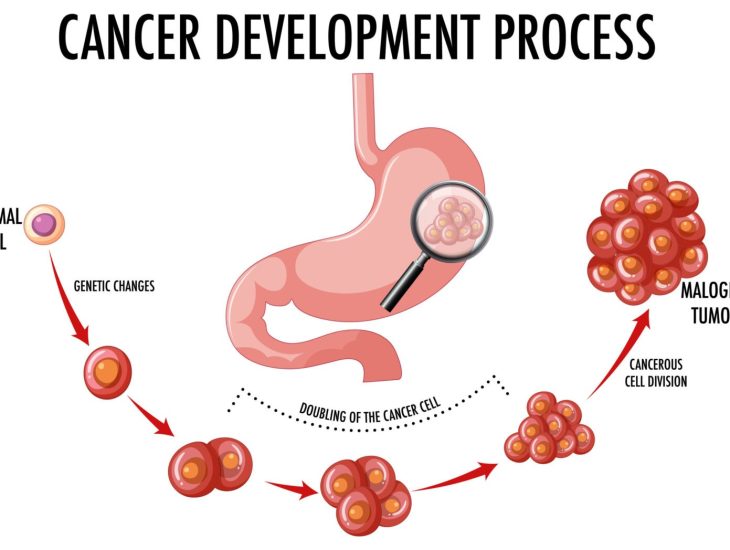Going gluten-free isn’t just a trendy diet choice – it’s essential for those with celiac disease. Learn more about the risks of gastrointestinal cancer and other associated diseases to stay safe.

Introduction
Celiac disease is an autoimmune disorder that occurs when the immune system reacts abnormally to gluten, a protein found in wheat, barley, and rye. This reaction can damage the lining of the small intestine, which can lead to malabsorption of nutrients and other health problems. Recent research has suggested a potential link between celiac disease and an increased risk of gastrointestinal cancer including the rare intestinal lymphoma. In this blog, we will explore this potential risk between celiac disease & intestinal lymphoma and the evidence that supports it.
Understanding GI Cancer or Intestinal Lymphoma’s Risk Factors
Gastrointestinal (GI) cancers are cancers that develop in the digestive system, including the esophagus, stomach, liver, pancreas, colon, and rectum. These types of cancers are often deadly and can be difficult to treat if not detected early. While the exact cause of GI cancers is not fully understood, there are several known risk factors, including age, diet, lifestyle, and genetic predisposition.
Several studies have suggested that individuals with celiac disease may have an increased risk of GI cancers. One meta-analysis published in the journal “Cancer Epidemiology, Biomarkers & Prevention” in 2015 examined the results of 21 studies that investigated the link between celiac disease and GI cancers. The analysis found that individuals with celiac disease had a significantly higher risk of developing GI cancers compared to the general population.
Link Between Celiac Disease and GI Cancer
Specifically, the study found that individuals with celiac disease had a 2.17-fold increased risk of developing GI cancers compared to those without celiac disease. The risk was particularly high for non-Hodgkin lymphoma, a type of cancer that affects the lymphatic system and is often associated with autoimmune disorders. The study also found a significantly increased risk of small bowel cancer, which is a rare form of GI cancer.
Importance of a Gluten-Free Diet in Reducing the Risk of Intestinal Lymphoma
Another study published in the “Journal of Clinical Gastroenterology” in 2021 examined the risk of GI cancers in individuals with celiac disease who were adherent to a gluten-free diet (GFD). The study found that individuals with celiac disease who followed a strict GFD had a lower risk of developing GI cancers compared to those who did not follow a GFD. However, the study also found that even among individuals who followed a GFD, the risk of GI cancers was still higher compared to the general population.
Potential Mechanisms
The exact mechanisms behind the increased risk of GI cancers in individuals with celiac disease are not fully understood. However, it is thought that chronic inflammation and immune system dysfunction associated with celiac disease may play a role. The presence of gluten in the diet may also contribute to inflammation and other negative effects on the gut that can increase the risk of GI cancers.
It is important to note that while these studies suggest a potential link between celiac disease and an increased risk of GI cancers, the absolute risk of developing these cancers is still relatively low. Additionally, the risk may vary depending on factors such as age, gender, and family history. However, individuals with celiac disease should be aware of this potential risk and work with their healthcare provider to monitor for any signs or symptoms of GI cancers.
Symptoms and Screening
People with celiac disease should also be aware of the symptoms of gastrointestinal cancer and report any unusual symptoms to their healthcare provider. The symptoms of gastrointestinal cancer may include:
- Abdominal pain
- Nausea and vomiting
- Bloating
- Changes in bowel habits (diarrhea or constipation)
- Unexplained weight loss
- Loss of appetite
- Blood in the stool
- Fatigue
Oddly enough, some of the above symptoms also cross over to a series of symptoms if gluten is ingested. However, if you are very concerned, your healthcare provider might suggest the following regular screening for gastrointestinal cancer. The screening may involve blood tests, endoscopy, and imaging tests to detect any abnormalities in the digestive system.
Managing Your Health: Minimizing the Risk of Intestinal Lymphoma in Celiac Disease
While more research is needed to understand the link between celiac disease and GI cancers fully, the evidence suggests that individuals with celiac disease may have an increased risk of developing these types of cancers. It is important for individuals with celiac disease to follow a strict GFD and work with their healthcare provider to monitor for any potential signs or symptoms of GI cancers, particularly intestinal lymphoma. By staying informed and taking proactive steps to manage their health, individuals with celiac disease can minimize their risk of developing these potentially deadly cancers.
Conclusion
There are a lot of linked disorders and increased risks out there, whilst we need to stay vigilant, it’s not a cause for fear or constant worry with this disease. At this time of this article, I’ve been diagnosed for 7 years now, the first two were spent in fear of getting sicker than I was because of all the above, but you can cause more stress to your body living in constant fear and worry. You still need to live life, as there are risks everywhere all around us, not just with your food.
Staying Informed: Resources for Learning More About Intestinal Lymphoma and Celiac Disease.
The University of Chicago Medicine have a well-written publication on this topic, if you are interested to learn more, have a look at this article RISK OF GASTROINTESTINAL CANCER IN CELIAC DISEASE
Looking for a deep dive into the world of Celiac and Gluten-Free living? Our other blogs are jam-packed with intriguing science and research topics that explore this fascinating subject matter in detail.
- Gluten Diets In Young Kids May Link To The Development Of Celiac Disease
- Celiac Disease Blood Test Takes Us Closer To An Accurate Diagnosis
- Is The Meat Glue In Your Deli Products Making You Sick?
- Connection Between Undiagnosed Celiac Disease And Infertility, Miscarriages, And Stillbirths
- Is Celiac Disease Risk Factors For COVID-19?
- Exploring The Connection Between Humans Microbes And Celiac Disease
- Periodontists Get Certified On Impact Of Celiac Disease On Dental Health
- What Are The Food Additives That May Cause Celiac Disease?
Remember to always stay curious and continue learning. Thank you for taking the time to read my post. Until next time…Jodes








